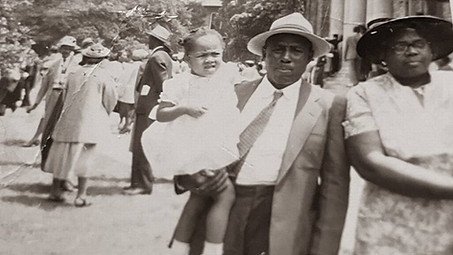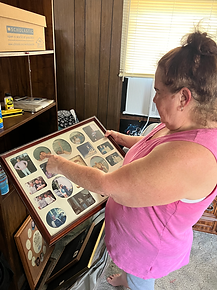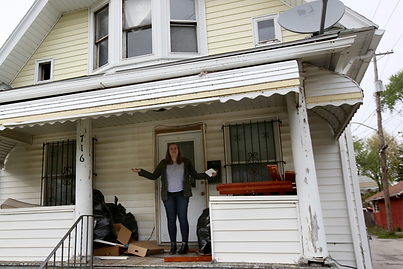The Charlotte Observer

Mangie and Catherine McQueen with a granddaughter. The Charlotte homebuilder was a prolific provider of housing for the city's Black community and the creator of several historically Black neighborhoods. But his own family plot is under threat after a developer bought a share of the land and is taking the family to court for the entire property. Photo provided by the McQueen family.
-
He built Charlotte’s Black neighborhoods. Now a developer could take his family’s land. Descendants of Mangie McQueen, a prominent mid-century builder, were shocked to learn a developer had convinced a relative to sell one-third of the family property, and even more so that he was suing them for the rest. Their story reveals a little-known legal maneuver that critics say rips away property and wealth from Black families. Read here
-
Charlotte got 178 emergency vouchers for homeless residents. Only 3 are in use. The Biden administration thrilled local housing authorities when it released $5 billion in COVID funding for vouchers to house some of the country's most vulnerable residents. But Charlotte ranked among the least successful cities in getting people moved into housing. Read here
-
"I covered affordable housing in Charlotte for 3 years. A sad pattern of displacement persists." In my last piece for the Observer, I reflected on the fact that some of my first and last stories were of mass displacements of vulnerable tenants, and what that means for Charlotte's ongoing housing crisis. Read here
"Pushed Out" series: Corporate investors buying mobile home parks threaten one of Charlotte's oldest forms of affordable housing

Stacy Sprinkle shows family photos as she packs up the mobile home her family has lived in for 50 years after an out-of-state investor bought the park and told every resident they had to leave. Photo by Lauren Lindstrom
-
Mobile home parks in Charlotte under threat — for reasons all too familiar Mobile homes have been a reliable source of affordable housing for families unable to buy traditionally constructed properties. But as land prices rise and development encroaches on once rural areas, corporate investors swarm. Read here
-
Charlotte family forced to leave home of 50 years Stacy Sprinkle's family members were the longest residents at Countrywoods Mobile Home Park in north Charlotte. But after the park's sold to an out-of-state firm and the new owners gave vacate notices to dozens of families, they will have to leave behind their home of half a century. Read here
-
Developers are gobbling up mobile home parks. Can residents buy them first? In an effort to push back on investor purchases, mobile home residents across the country are pursuing cooperative ownership, helped by a nonprofit working to put control back in the hands of residents and prevent displacement. Read here
-
Here’s who has been buying up mobile home parks in Charlotte Data visualization of recent mobile home park sales in Mecklenburg County, North Carolina. Read here
The Blade (Toledo, Ohio)

Reporting on local officials' failure to monitor the status of repairs houses where children had been lead poisoned led to us knocking (and re-knocking) on some 200 doors in four Ohio metro areas. Here is yet another no answer captured by my favorite project collaborator, former Blade photojournalist Katie Rausch.
-
Families find some solace in organ donations As deaths from opioid addiction continued to spike in Ohio, nearly one in five donated organs from one local transplant agency were someone who had overdosed. But few families realize their loved one is eligible to donate, experts say, news that was solace for one Toledo-area family after losing their son. Read here
-
State orders unsafe homes in Toledo vacated due to lead Hundreds of homes across Ohio had been found to be the source of a child's lead poisoning and ordered to stay vacant until repairs are done. But our reporting showed many of those homes were not vacant, and families didn't know their landlord had been ordered to fix the units, leaving children and families at continued risk. Read here
-
Lead in Toledo: Health Dept. failed to follow up on warnings Inspection documents showed that local health officials knew for months, and sometimes years, that homes in Toledo had been deemed too unsafe to live in but no one was monitoring them to ensure landlords did not re-rent them until repairs were made. Read here
-
Impact of reporting: Task force to look into the Toledo health department's policies Read here
-
The 2022 Local News Impact Summit hosted highlights the forces behind and solutions to the city's affordable housing crisis. My moderated panel with local experts on displacement begins at 1 hour, 12-minute mark.
I joined the National Journalism Institute Press Club to discuss the food insecurity and how it intersects with housing, health and every beat in the newsroom with fellow reporters covering the topic.